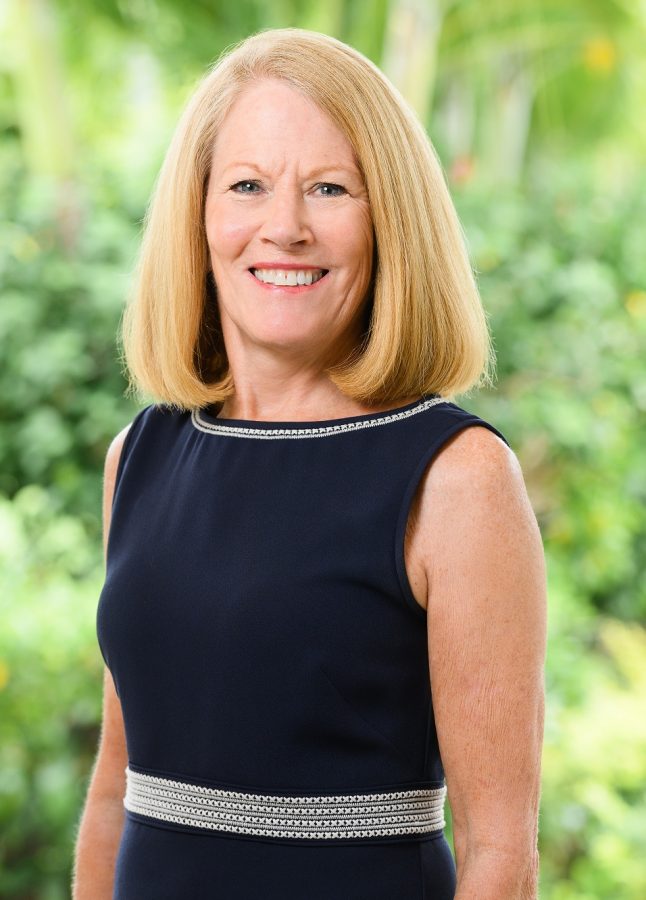CUH President Babington Responds to Covid-19
Dr Lynn Babinton, portrait taken in Honolulu Hawaii at Chaminade University- Photo credit to Babington
In the light of Covid-19, many if not all schools around the world have shifted huge operations to make sure they are doing what’s best for their school and community.
“Once we get the virus under control, it will be difficult to move back to our former state as a university, a state, or a country. The world has changed,” Dr. Lynn Babington, president of Chaminade University of Honolulu, said last week.
She also believes that we need communication more than ever right now and is dedicated to keeping Chaminade afloat during this pandemic.
Babington joined Chaminade as president in August of 2017 and during this pandemic, she said that “as a leader, the most important thing that I can do is to communicate with honesty and transparency and communicate often.”
The following is a lightly edited one-on-one interview with Babington last week.
Arissol: How is your situation? How are you coping with all of this as the school and the community expect you to make decisions and guide us through safely and effectively during these dramatic times?
Babington: I am blessed with a very diverse and talented group of senior leaders. We meet weekly as a group, and I meet every day with at least one or more of the team. We are addressing current challenges, working on projects, developing scenarios for the future, and stress testing business models. I continue to be on campus every day, supporting our students and other campus workers. I spend a lot of time on Zoom and in webinars.
Arissol: During this pandemic, how do you tend to support the campus and students, especially for those who are still on campus?
Babington: We are providing robust support for students through ramped-up advising and mental health counseling in person and using telehealth. We are locking arms with our students and their families and will continue to support them mentally and spiritually. For example, Campus Ministry hosted our first live streaming of the Sunday Mass and Ester services at Mystical Rose, which drew 500 views. Critically, we continue to employ and provide benefits to all faculty and staff.
Arissol: Is there anything else set up or in motion to support the students of Chaminade?
Babington: We continue to have around just under 50 students and resident advisors living in the residence halls. These are students for whom going home is not an option. All other students received rebates for housing, meal plans, and parking. Our student life team has been busy with virtual programming for all of our students.
Arissol: Financially, has there been anything in order to support students who have been affected by this harder than most?
Babington: Chaminade received about $1.4 million from the CARES Act, half of which went directly to students. The other half went to Chaminade for specific expenses like issuing partial refunds for room and board. The CARES monies we received ($741,000) will all be distributed to students.
Arissol: Some students were confused as they were not notified of this funding that they could apply for. Some say it was very late notice and didn’t feel like they got a chance.
Babington: The notices to students went out three times to make sure they got it. [On] April 14, we sent out an email to each student from Dean Allison Jerome. This message was repeated and the final message [on] April 20, which was a letter from me to all faculty, staff, and students for an April 22 deadline.
Arissol: Do you have any fears? Any concerns as we and the whole world fight this virus?
Babington: I am hopeful as a society we have learned how to better care for others, that we need more equality in our economics and access to health care and that we need to care for the environment now. For Chaminade, our challenges will be retaining our current students (they may not have the economic means to return to Chaminade or their families may not want them so far from home) and to attract a new student class. All universities, but particularly those in Hawaii (with geographic challenges and high unemployment) will be challenged with the same thing and how to balance revenues with expenses. I suspect in the next few years higher education will see lots of changes.
